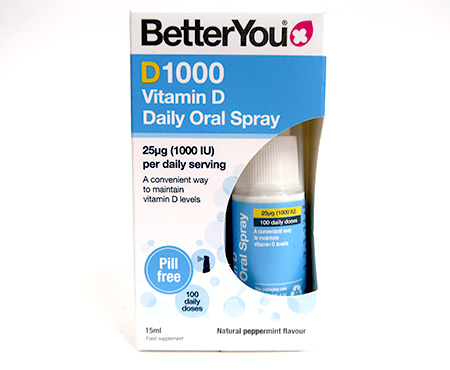Other Options Include
Vitamin D supplements offer many benefits that maintain your overall health, such as boosting your immune system, contributing to the development and maintenance of your bones and enhancing calcium absorption. With a daily dose of our vitamin D spray, helping to ensure your body and your wellbeing is taken care of.
How does vitamin D work
When exposed to sunlight, your skin can produce its own vitamin D. We all have vitamin D receptor cells, which produce vitamin D when exposed to ultraviolet B (UVB) from the sun via a chain of reactions that begins with cholesterol conversion in the skin.
Vitamin D is stored in the body's fat cells after it is absorbed through the skin or obtained from food or supplements. It remains inactive until it is required. The liver and kidneys convert stored vitamin D into the active form required by the body through a process known as hydroxylation (called calcitriol).
Why is vitamin D Important
Vitamin D is required to maintain the health of bones, teeth, and muscles. A lack of vitamin D can cause bone deformities in children, such as rickets, and bone pain in adults, known as osteomalacia.
Who is vitamin D good for
The main source of vitamin D in our bodies is direct sunlight. Our bodies can produce vitamin D when our skin is exposed to direct sunlight outside. However, getting enough vitamin D through regular sunlight exposure can be difficult, especially during the winter months or if you spend a lot of time indoors.
From November to March in the UK, the sunlight we are exposed to does not provide enough UVB radiation for our skin to produce the vitamin D we require. Because it can be difficult to obtain natural vitamin D from both sunlight and our diet, the NHS recommends taking vitamin D tablets or sprays to help keep your levels topped up during the winter months.
As we get older, we start to become less efficient at using the vitamin D our body produces. Therefore, It is important to support your physical health and strength as you start to age.
What happens when you are vitamin D deficient
A lack of vitamin D can lead to a loss of bone density, which can lead to osteoporosis and fractures (broken bones). Severe vitamin D deficiency can also contribute to the development of other diseases. It has the potential to cause rickets in children. Rickets is a rare disease that causes bones to soften and bend.
Side effects and precautions
Unless taken in excess, most people do not experience side effects from vitamin D. Overdose of vitamin D can result in
Fatigue
Dry mouth
Nausea
Vomiting.



